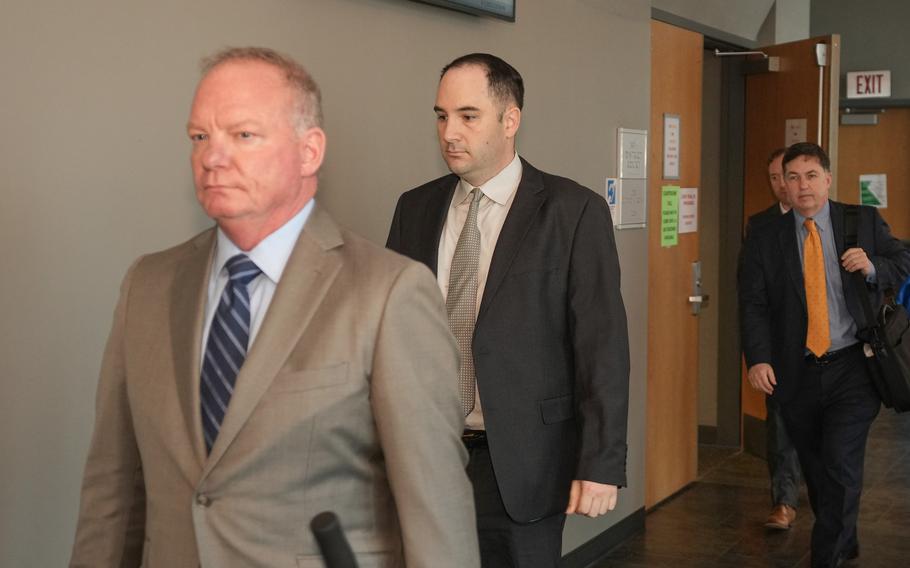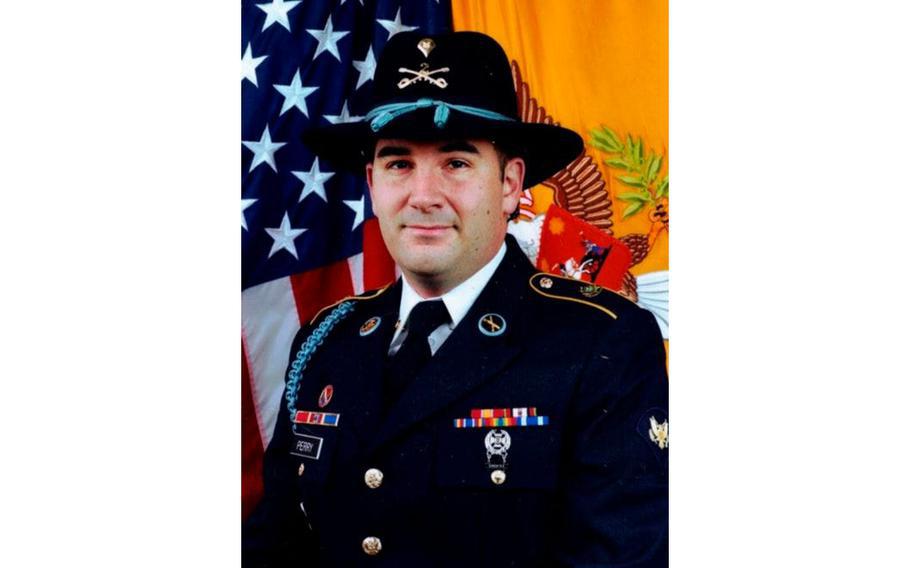
Army Sgt. Daniel Perry, right, and his attorney Doug O’Connell walk out of the courtroom during jury deliberations Friday, April 7, 2023, in his trial in the shooting death of Garrett Foster, an Air Force veteran. The Army has begun the process to discharge Perry after a jury found him guilty of murder. (Jay Janner/American-Statesman)
AUSTIN, Texas — The Army has begun the process to discharge Sgt. Daniel Perry after a jury found him guilty of murder more than two weeks ago, though the soldier’s defense attorney questioned whether the service is doing so too quickly.
“The unit is initiating a separation,” said John Pennell, spokesman for the 11th Airborne Division, Perry’s unit at Fort Wainwright, Alaska.
But Perry’s attorney Doug O’Connell said until the conviction is official, which won’t happen until after the soldier is sentenced, there is no court record to use as grounds for discharging him.
“And given the credible evidence of jury misconduct, it’s very possible that Sgt. Perry will be granted a new trial,” said O’Connell, who is a retired Army Special Forces colonel.
Perry, 36, was convicted April 7 in the shooting death of Garrett Foster on July 25, 2020. Foster, a 28-year-old Air Force veteran, was carrying an assault rifle in downtown Austin during a Black Lives Matter protest, when Perry, who was working a side job as a rideshare driver, turned his car into a group of protesters. Perry, who was also armed, said he shot Foster because Foster pointed his rifle at Perry’s car.

Army Sgt. Daniel Perry, 36, told police that he shot and killed Air Force veteran Garrett Foster, 28, during a Black Lives Matter protest in Austin, Texas, on July 25, 2020, because Foster pointed a rifle at Perry. The soldier, who is now stationed at Fort Wainwright, Alaska, was convicted of murder on April 7, 2023. (Broden & Mickelsen Law Firm)
O’Connell said the Army should slow down on discharging Perry because his sentencing has not been scheduled. More so, the attorney filed a court motion that alleged jury misconduct and requested a new trial, claiming there was outside influence on the jurors because one of them said another brought in printed copies of online research that was done outside of the trial.
Sentencing is on hold until the judge rules on Perry’s request for a new trial.
Yet Perry’s discharge has been slower than other soldiers in a similar position, according to another lawyer.
Robert Capovilla, a former Army lawyer who now works primarily as a defense attorney for service members, said about 80% of his clients with civilian charges are discharged before a trial.
“They can absolutely use the investigation conducted by the local authorities to move forward with separation and typically speaking, they will do that before the resolution of the soldier’s case in civilian court,” he said.
When the Army doesn’t, such as in Perry’s case, there are two explanations: the service might look to court-martial the soldier on military charges or the service wanted to make certain the soldier had a fair opportunity in court, Capovilla said.
The latter is what Perry’s unit said attributed to the delayed discharge.
“The jury in Texas could have just as easily returned a not-guilty verdict. It would have been imprudent for us to have moved any sooner toward separation,” Pennell said.
Perry, who enlisted about 10 years ago, was assigned at the time of the shooting to Fort Hood, Texas, which is about an hour north of Austin. He was later reassigned to the 11th Airborne Division’s 1st Brigade Combat Team.
It was nearly a year after the shooting when a grand jury indicted the soldier on a murder charge.
“Sgt. Perry received death threats after his encounter with Mr. Foster and the other protestors. Our understanding is that the Army [moved] him for his own safety,” O’Connell said.
The case had an added development. Less than 24 hours after Perry’s conviction, Texas Gov. Greg Abbott vowed to pardon the soldier as soon as he can.
However, Abbott’s potential pardon has “no bearing” on the unit’s decision, Pennell said.
Even if a new trial is granted, the Army’s policy would still allow Perry’s unit to move forward with discharging him. All that is required are “serious allegations that would impact the good order and discipline of the unit,” Capovilla said.
Army separation boards have a lower burden of proof than a trial and only must be 51% convinced the misconduct occurred, he said.
Since 2020, at least two other Fort Hood soldiers have been charged with murder by civilian authorities. Cpl. Nakealon Keunte Mosley is still awaiting trial in Bell County in the death of his wife and remains in the Army.
Cory Grafton was a specialist when he was arrested in November 2020 for the death of a woman in Killeen in 2019. He was discharged a month later. Grafton pleaded guilty in court and was sentenced to 40 years in prison in December 2021.
At Fort Bliss, Texas, Capt. Clevy Nelson-Royster was arrested in October 2020 and charged with murder in the death of another Army captain in El Paso. She was discharged within about eight months, said Brock Benjamin, her attorney. The case has not gone to trial yet.
“It is chain-of-command dependent,” he said. “I've had people who have family violence [charges] and they've waited until they get convicted. Other family violence cases, the second of the arrest, the Army is [discharging] the person. I can't come up with a rhyme or reason.”
Benjamin did not represent Nelson-Royster in the hearing for her discharge, but said the Army used the police report as evidence for conduct unbecoming of an officer.
O’Connell said Perry was never arrested and the lead detective described the shooting as a “justified homicide.”
“I think it would probably serve the Army to slow down. It sets a bad precedent to terminate soldiers based simply on media reports,” he said.